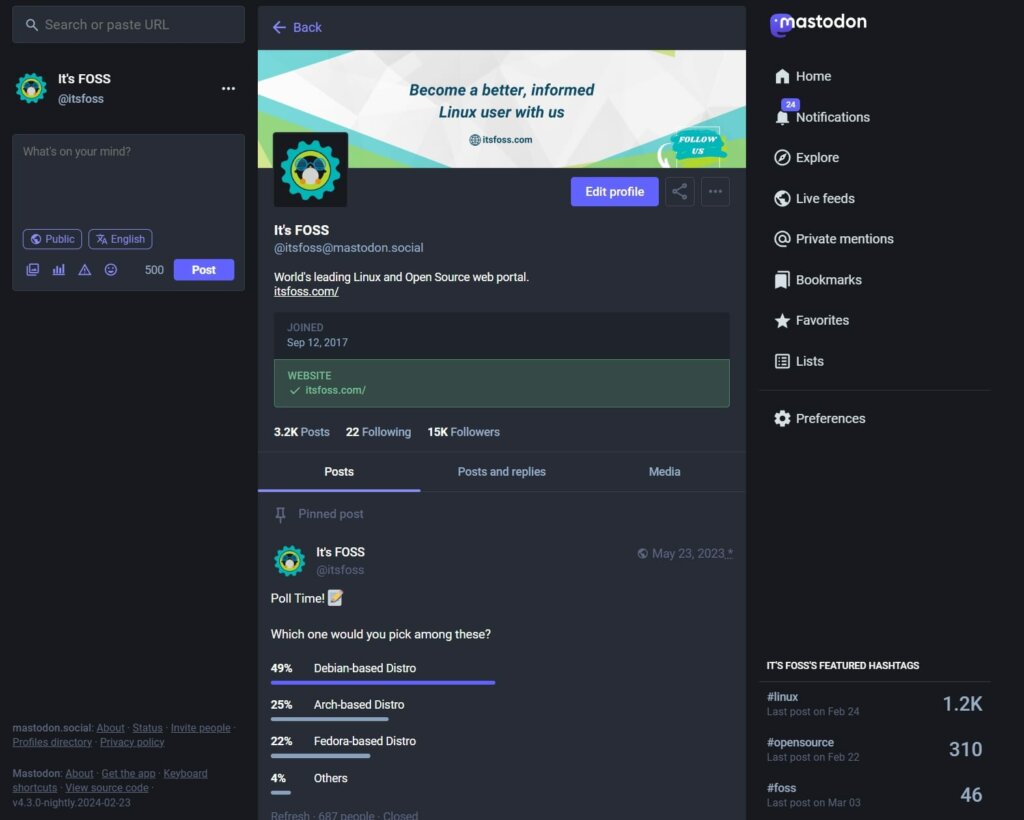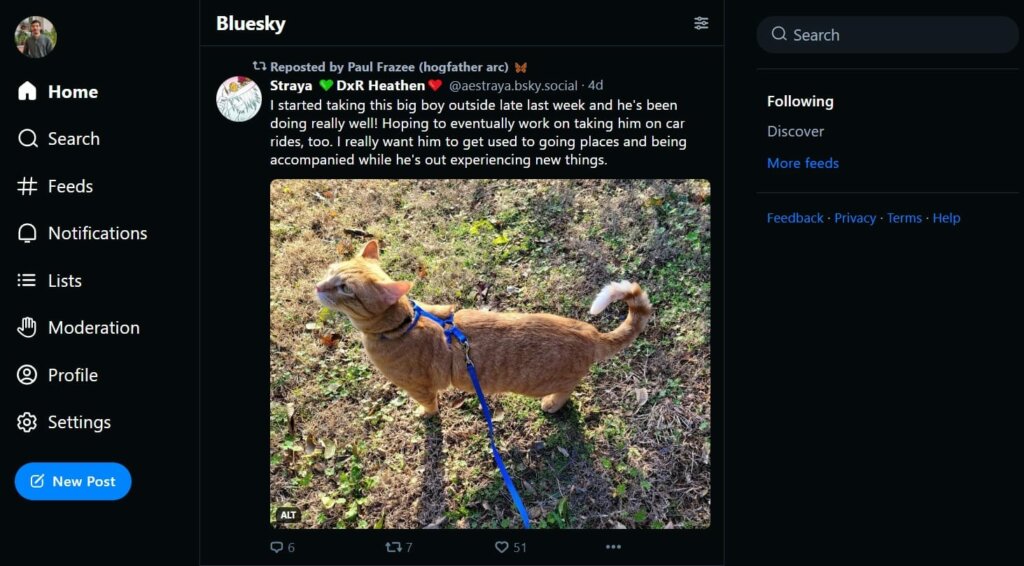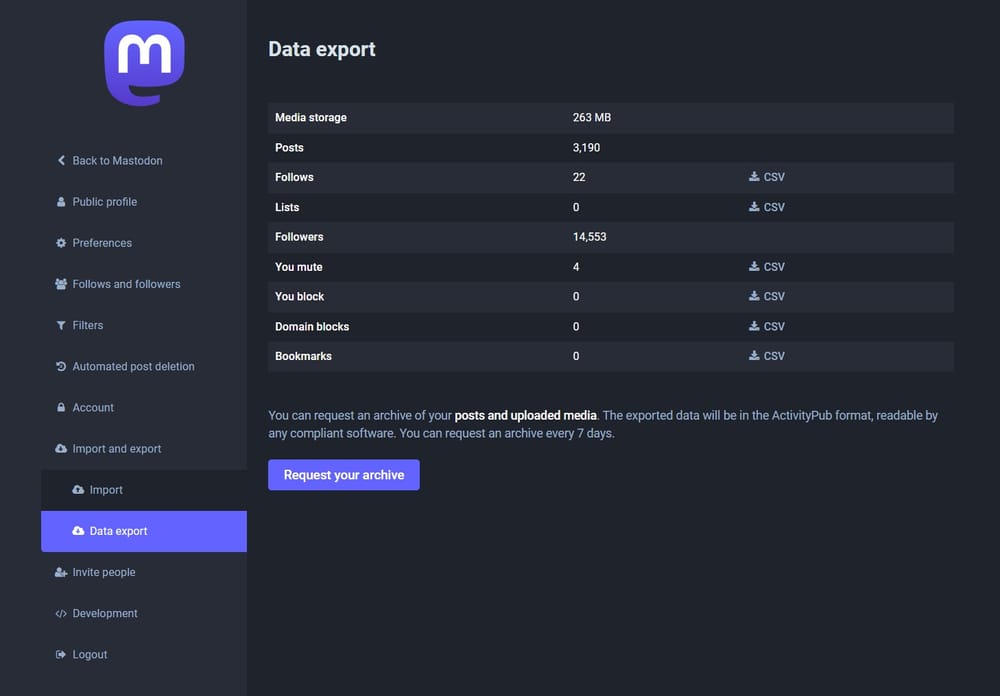
- The Bluesky vs. Mastodon question is on every ex-Xer’s mind.
- Which social media alternative is best for you?
- We weigh up Bluesky vs. Mastodon so you don’t have to.
The Twitter-becomes-X debacle has been discussed weekly since a certain someone bought the social media company and turned it into the handcart in which we’re all going to Hell. We’re tired of talking about it, frankly. Although the mass migration from the site that was threatened by many users never quite came to pass, a new dawn broke for alternative social media sites.
Meta-owned Instagram tried to go toe-to-toe with X by launching its own microblogging platform, Threads, but it was outliers Mastodon and Bluesky that took in those users who couldn’t bear to keep using what used to be Twitter.
With images from ITSFOSS‘s review, let’s take a look at the sites and see what users are saying.
Mastodon was launched in 2016 by Eugen Rochko as a decentralized microblogging platform that was really quite hit-and-miss. It spent a while trying to replicate Twitter too closely, eventually developing into a social medium operating on distributed servers, called instances, allowing for independent networks with different themes and topics.

Bluesky, on the other hand, began as a team funded by Twitter to build an open and decentralized standard for social media, in 2019. Twitter co-founder Jack Dorsey was on the team, hoping the platform would be the first to utilize the protocol.
When you-know-who took over, the plan for an open standard Twitter (and the name itself) disappeared. Since 2021, Bluesky has been an independent company backed by Dorsey ever since, and open sourced the client code for the platform, with an invite-only system for the website. Now, it’s opened up to everyone.

Jack Dorsey left Twitter and is now on Bluesky’s board.
In terms of user experience, Mastodon has the benefit of being around for longer. The site has had time to evolve with community requirements. The interface is relatively similar to Twitter, with all the right differences to make the move feel worth it.
There’s no algorithm dictating what you see in the public feed (which some of us might miss, despite its foibles) and posts with more organic engagement will likely show up first. Otherwise, the feed shows posts by users you follow chronologically.
Experience does vary somewhat based on the instance you signed up to, because that impacts what you see and what server rules are complied with. This is pretty adjustable to your taste, though.
The number of instances to choose from is often lauded as a big plus for Mastodon. In fact, many reviews and user guides focus on all the benefits of the system but doesn’t elaborate on how best to make use of it.
That means it’s difficult to actually find the community that’s supposedly on offer – not many people want to put that much effort into building their social media profile. We’ve all gotten used to a handy algorithm to do it for us.

Glance too quickly and you’d think you were on the Twitter of old.
Another double-edged sword is the human moderators. In almost every way, servers moderated by humans are better for users, particularly when you can essentially choose servers moderated by individuals whose values align with your own.
Some have critiqued the system because, like the forum days of old, the people in charge can tend towards being power-crazed leaders with too much time on their hands. Not that that’s a Mastodon problem: it’s just people.
Bluesky, on the other hand, uses automated moderation. In many ways, it closely mimics Twitter in its heyday (unsurprising, really, given the Dorsey involvement) and you’d be forgiven for forgetting you’d switched to a new platform.
You get the option to choose an algorithm to follow per your requirements; limit your feed to just people you follow, or a custom one that learns what you like (a ‘for you’ feed tailored to your needs, baby!).
Although it’s separated from Twitter, Bluesky is still a corporate-backed product. It’s open source, and may soon let you host your own instance, Mastodon-style, but for now it’s a board-controlled entity.
Even if it completes its federation network and lets you self-host instances, Bluesky as a primary platform will use advertising and other monetization strategies.
Another one-up for Mastodon, perhaps, is its non-profit status and crowdfunded development. It’s not reliant on investors (like Twitter was…) and companies and users donate to Mastodon, keeping it free from monetization.
When it comes to privacy, both Mastodon and Bluesky get points for not requiring a phone number for sign up. Beyond that, Mastodon seems to come out ahead.
It allows users to push public posts or post only for followers and interact with individual followers using private mentions (a bit like direct messaging, which isn’t technically an option). You can also request an archive of your data and export it in an Activity Pub compatible format, and easily move your data to another instance or (within some limits) even move your account data to another handle.
Mastodon’s privacy policy is simple and easy to understand. 
You can’t make your profile private in the same way you can on Instagram or X, but there is a setting that automatically deletes posts, and you can set up your account so you manually approve followers.
Bluedsky does offer private accounts but doesn’t use two-factor authentication – which Mastodon does. Plus, if your Bluesky account is private, your posts are only hidden from view for users who haven’t logged in to the site. The data is public to any other server connected to the network.
Data export is in the beta phase, so getting it all downloaded is a mammoth task. Bluesky’s privacy policy does clarify it might use your personal information for marketing and research and share it with third party services. FOSS doesn’t think it’s a good privacy policy for web service in 2024.
The thing is, both Bluesky and Mastodon come out remarkably well against the platform they might replace – and the major social media that’s owned and run by tech giants. Depending on what’s spurred you to seek an X alternative, the two platforms offer a well-rounded selection.
Mastodon, though perhaps on the moral high ground, definitely requires more effort to set up and establish a presence – or at least a timeline that keeps you scrolling in the same way algorithm-run feeds do. Bluesky offers pretty much what was lost in the switch to X, perhaps without the years of user-feedback-influenced improvements.
Early reviews of Bluesky, back in invite-only beta, all celebrated its comparative positivity, harking back to ‘simpler times’ online. Whether it’s remained quite so fluffy and nice is questionable – as is how strong a marketing factor that will be.
Increasingly, you’ll notice that if you scroll to the bottom of a company’s website there’ll be a link to a Bluesky or Mastodon account – maybe even both. While the more mainstream services are still going, there is a sense that they’ve exhausted their peak and a new era of social media feels closer to realization than it has for years – maybe even since the beginning of Instagram.
So, give one of the alternatives a go, even if only to say you were there when it all started.








